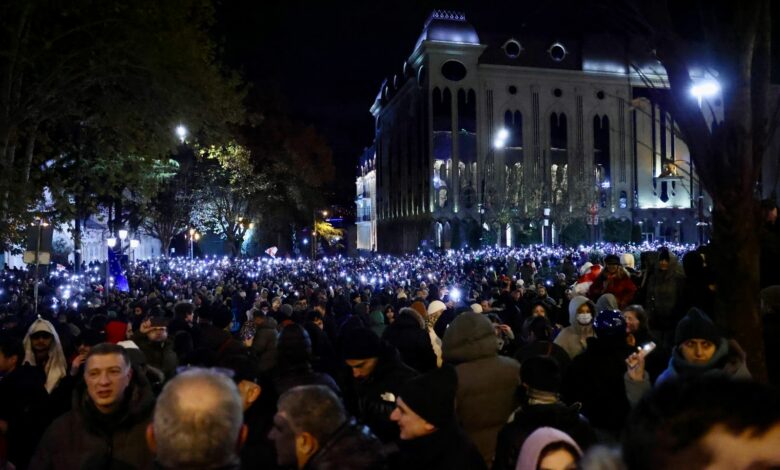
IDU Condemns GD Government, Urges Sanctions Against Ivanishvili
The International Democracy Union (IDU) adopted a resolution at a forum in Brussels on May 16, attended by 80 parties from around 60 countries, condemning the Georgian Dream government’s continuing decline into authoritarianism, repression of civil society, and alignment with Russia. The resolution calls for coordinated international sanctions against GD’s patron Bidzina Ivanishvili, and his enablers. IDU urges the GD government to set “a specific date for free and fair parliamentary elections.”
The resolution, tabled by Georgia’s opposition United National Movement (UNM), reaffirms the IDU’s solidarity with the Georgian people and their just fight for democracy and European integration. It denounces the GD-led government’s “drift toward the Russian orbit” and demands a “halt to all repressive legislation”.
The IDU urges the GD government to “immediately halt all repressive legislation” and to cease the “use of terror against its own citizens, civil society organizations, independent media, and political opponents.”
The resolution also calls for holding accountable “perpetrators of brutality” involved in the violent crackdown on protesters and calls on the international community to investigate the actions of all officials and police officers responsible for targeting civil society and political opponents.
The resolution directly targets Ivanishvili, the GD’s honorary chairman and principal powerbroker, urging democratic governments to suspend financial cooperation with the GD government “until new parliamentary elections are held.” Most notably, it calls for coordinated sanctions on Ivanishvili, his family, companies, and enablers, including freezing all of his assets.
“The IDU calls on democratic governments to immediately introduce coordinated sanctions against Bidzina Ivanishvili and his family, companies, and networks of enablers,” the resolution states. It further urges the international community to disconnect Ivanishvili’s Kartu Bank from SWIFT and Visa/Mastercard systems, and to impose sectoral sanctions on businesses supporting the GD regime—particularly those in the copper ores and non-ferrous metals sectors.
Georgia is increasingly facing international isolation. On May 15, a group of European lawmakers and members of the U.S. Helsinki Commission, issued a letter to Portugal’s Prime Minister urging a ban on Georgian Dream officials from attending the upcoming OSCE Parliamentary Assembly session. The letter argued that participation by GD representatives would “legitimize their repressive governance and provide them with a platform they do not deserve.”
Earlier this month, GD officials were excluded from the EU’s informal “Gymnich” meeting of foreign ministers held in Warsaw on May 7–8, which was attended by other EU candidate countries. The EU ambassador to Georgia cited the country’s democratic regression and recent repressive developments as the reason for the exclusion.
Following the violent dispersal of protests in November and December 2024—which involved arbitrary detentions and alleged abuse of demonstrators—the EU suspended visa facilitation agreement for Georgian diplomatic and service passport holders.
Western partners have increasingly resorted to targeted financial sanctions and travel bans against Georgian officials deemed responsible for undermining democratic norms. In the United States, the House of Representatives recently passed the bipartisan MEGOBARI Act, which mandates sanctions on GD officials involved in significant corruption or violence intended to obstruct Georgia’s Euro-Atlantic aspirations. The bill is now to be considered in the U.S. Senate. The bill also envisages extension sanctions to immediate family members of sanctioned individuals.
The IDU includes the European People’s Party (EPP) and the European Conservatives and Reformists (ECR) from Europe.
Also Read:
- 2025 | Chronicle of Repression
- 16/05/2025 – CSOs Report Reveals Human Rights Crisis in Georgia Following 2024 Elections
- 15/04/2025 – UPDATE: Estonia, Latvia, Lithuania Expand Sanctions on Georgian Officials
- 10/04/2025 – PACE Condemns Rapid Democratic Backsliding in Georgia, Urges Repeal of Controversial Laws
- 10/04/2025 – UK Sanctions Georgia’s Prosecutor General, Three Security Officials for Human Rights Abuses
- 09/04/2025 – Zurabishvili: “We are Watching Our Democracy Being Dismantled in Real Time”, Urges Europe to Act
- 24/03/2025 – Germany Introduces Further Entry Bans on GD Officials
- 01/05/2025 – EPP’s Resolution Calls for Sanctions on Ivanishvili and New Elections
This post is also available in: ქართული Русский